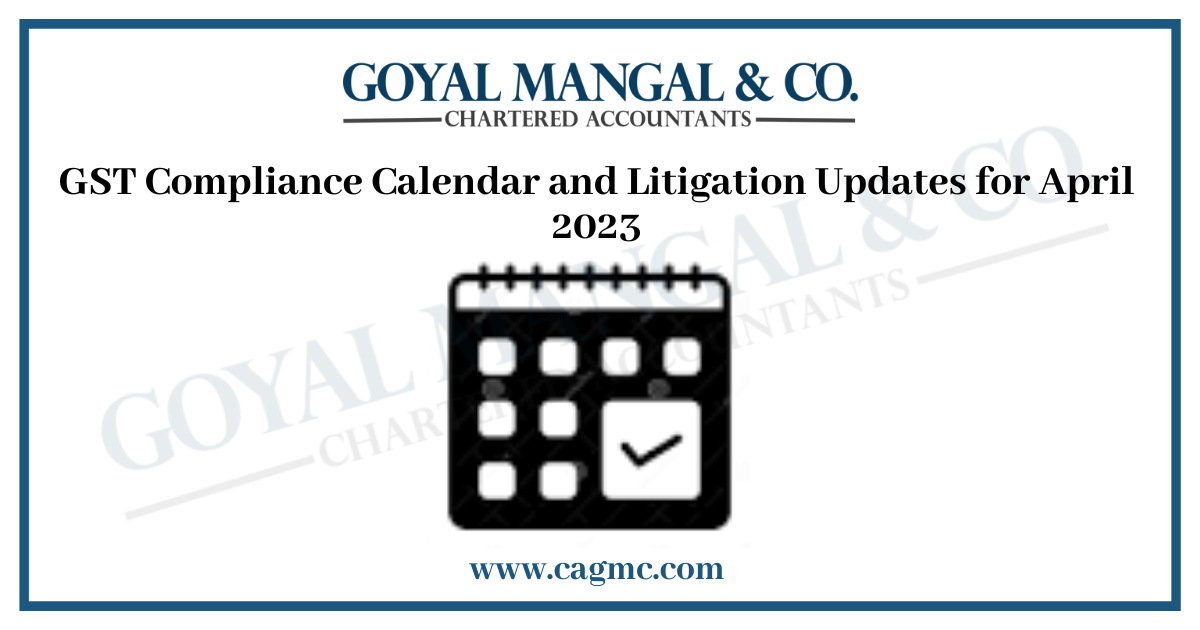
April is the start of the new financial year in many of the countries. During this time Individuals and businesses typically review their financial performance from the previous year and set goals and budget for the coming year. It becomes crucial for businesses and individuals to keep track of their compliance requirements to ensure they are adhering to the legal & regulatory framework and to avoid payment of Interest and late fee. Let us start with a Compliance Calendar for GST and due dates for April 2023. In this article we will talk about the GST Compliance Calendar for April 2023.
|
Table of Content |
Quick Look
The Goods and Services Tax (GST) has been in effect in India since July 1, 2017, and has since undergone several changes and amendments. Since then, the GST Council has been consistently working towards making GST more efficient, transparent, and taxpayer-friendly. As a business owner, it is crucial to stay updated on the compliance calendar and litigation updates to ensure smooth operations and avoid any legal troubles. GST compliance is a crucial aspect for all businesses, and it is essential to be aware of the compliance calendar and litigation updates for April 2023.
GST Compliance Calendar for April 2023
The Goods and Services Tax (GST) regime has completed more than three years of implementation in India. The GST Council, in its 47th meeting, announced various changes and updates for the taxpayers, including the introduction of a compliance calendar. The compliance calendar will help taxpayers to keep track of their GST Return filing and payment deadlines. Additionally, there have been updates in the GST litigation front as well, which are as follows:
| Due Date | Compliance |
| 10th April | GSTR-1 (Monthly) – for the month of March 2023 |
| 13th April | GSTR-7 (Monthly) – for the month of March 2023 |
| 18th April | GSTR-3B (Monthly) – for the month of March 2023 |
| 20th April | GSTR-5 (Monthly) – for the month of March 2023 (for non-resident taxpayers) |
| 22nd April | GSTR-6 (Monthly) – for the month of March 2023 (for input service distributor) |
We have tried to provide the compliance of GSTR-1, GSTR- 3B and other miscellaneous Returns related with GST in greater detail, so that every minute information could be covered in brief.
- GSTR-1
The GSTR-1 Return contains the details of Outward Supplies made by registered person within and outside India.
| Tax Period | Due Date | Person Eligible |
| Mar-2023 (Monthly Return) | 11-04-2023 |
|
| Jan- Mar-2023 (Quarterly Return) | 13-04-2023 |
|
- GSTR–3B
This return contains the details of outward supplies (consolidated data of GSTR-1), inward supplies subject to RCM payment, ITC details, exempt, nil-rated, and non-GST inward supplies, payment of tax details.
The businessman who chooses to file quarterly return through QRMP Scheme with less than 5 crore turnovers during the previous financial year, the due date for previous quarter GSTR-3B is 22nd of South India and 24th for North India of the following month after the quarter end.
| Tax Period | Due Date | Business Turnover | State |
| Mar-2023 (Monthly) | 20th April 2023 | More than 5 Crores | All |
| Jan-Mar-2023 (Quarterly) | 22nd April 2023 | Up to 5 Crores | Chhattisgarh, Gujarat, Maharashtra, Karnataka, Goa, Kerala, Tamil Nadu, Telangana, Andhra Pradesh, Daman & Diu and Dadra & Nagar Haveli, Puducherry, Andaman and Nicobar Islands, Lakshadweep |
| Jan-Mar-2023 (Quarterly) | 24th April 2023 | Up to 5 Crores | Himachal Pradesh, Punjab, Uttarakhand, Haryana, Rajasthan, Uttar Pradesh, Bihar, Sikkim, Arunachal Pradesh, Nagaland, Manipur, Mizoram, Tripura, Meghalaya, Assam, West Bengal, Jharkhand, Odisha, Jammu and Kashmir, Ladakh, Chandigarh, Delhi. |
- Other Miscellaneous Returns
| Return Name | Tax Period | Due Date | Person Eligible |
| GSTR-4 (Yearly) | April 2022 -March 2023 | 30th April 2023 | Composition Taxpayer |
| GSTR -5 (Monthly) | March 2023 | 20th April 2023 | Non-Resident Taxpayers |
| GSTR-5A (Monthly) | March 2023 | 20th April 2023 | ODIAR Service Provider |
| GSTR-6 (Monthly) | March 2023 | 13th April 2023 | Input Service Distributor |
| GSTR-7 (Monthly) | March 2023 | 10th April 2023 | Person who is required to deduct Tax deducted at source under GST. |
| GSTR-8 (Monthly) | March 2023 | 10th April 2023 | Electronic commerce operator who are required to deduct Tax Collected at Source under GST |
| GSTR-11 (Monthly) | March 2023 | 28th April 2023 | Person having unique identification number |
| CMP-08 (Quarterly) | Jan2023 – March 2023 | 18th April 2023 | Composition Scheme |
Litigation Update regarding GST for the month of April 2023
On February 18, 2023, the Union Minister for Finance and Corporate Affairs, Smt. Nirmala Sitharaman, presided over the 49th meeting of the GST Council in New Delhi.
The following are the important updates on GST litigation in April 2023:
- GST on Ocean Freight: The issue of whether GST is applicable on ocean freight for exports is still a matter of litigation. The Gujarat High Court has recently given its decision in favour of the taxpayer, stating that GST cannot be levied on ocean freight for exports. However, the government has appealed this decision in the Supreme Court, and the matter is pending for final adjudication.
- Refund of Input Tax Credit (ITC): The Delhi High Court has recently ruled that if a taxpayer has accumulated ITC due to the inverted tax structure, they are entitled to refund of such ITC. The court has also directed the GST authorities to process such refund claims within a reasonable time.
- GST on Director’s Remuneration: The issue of whether GST is applicable on director’s remuneration is also a matter of litigation. The Kerala High Court has recently given its decision in favour of the taxpayer, stating that GST cannot be levied on director’s remuneration. However, the government has appealed this decision in the Supreme Court, and the matter is pending for final adjudication.
- Refund Claims: The Central Board of Indirect Taxes and Customs (CBIC) have issued a circular on the timely disposal of refund claims. The circular emphasizes the importance of timely disposal of refund claims and provides guidelines for processing refund claims.
- E-Invoicing: The GST Council has made e-invoicing mandatory for businesses with a turnover of Rs. 50 crore or more from 1st April 2023. E-invoicing will improve compliance and reduce the possibility of errors.
- GST on discounts – The Delhi High Court has recently held that GST cannot be levied on the discounts given by a supplier to a dealer, provided the discount is given before or at the time of supply. This decision is likely to have a significant impact on the e-commerce sector, where discounts are a common marketing strategy.
- GST on late payment fees – The Maharashtra Authority for Advance Rulings (AAR) has held that late payment fees charged by banks for credit card payments are liable to GST. This decision is likely to have a significant impact on banks and other financial institutions.
- GST on software development services – The Gujarat Authority for Advance Rulings (AAR) has held that software development services provided by an Indian entity to a foreign customer are not liable to GST. This decision is likely to provide relief to Indian software companies that provide services to foreign customers.
- GSTR-3B late fees: The Gujarat High Court, in its recent ruling, held that the late fee charged for the delayed filing of GSTR-3B is a fee and not a penalty. This ruling may have an impact on the interpretation of late fees in other states as well.
- Input tax credit (ITC): The Karnataka High Court, in a recent ruling, held that taxpayers cannot claim ITC on purchases made from unregistered dealers who are not required to register under GST. This ruling may have an impact on taxpayers who have claimed ITC on purchases made from unregistered dealers.
The GST Council has, among other things, recommended the following policies regarding GST compensation, the GST Appellate Tribunal, approval of the Group of Ministers’ Report on Capacity Based Taxation and Special Composition Scheme in Certain Sectors on GST, GST rates on Goods and Services, and other trade facilitation measures and various notifications and advisory has been discussed.
- GST Appellate Tribunal
The Council approved the Group of Ministers’ report on GSTAT with a few changes. Members will receive notice of the final draft of GST law changes for their remarks. The chairperson has been given the permission to make the decision.
- Approval of Report of GOM (Group of Ministers) on Capacity based Taxation and special composition scheme in certain sectors of GST.
The Council accepted the suggestions with a view to plug the leakage and increase revenue collection from goods like pan masala, gutkha, and chewing tobacco.
The council approved the recommendation of GoM that:
- The capacity-based levy not to be prescribed.
- Compliance and tracking measures to be taken to plug leakage.
- Exports of such commodities to be allowed only against LUT (Letter of Undertaking) Compensation cess levied on such commodities to be changed from ad valorem to specific tax-based levy.
Conclusion
Compliance with GST regulations is essential for every taxpayer to avoid penalties and other legal complications. The GST compliance calendar provides a clear outline of the deadlines that taxpayers need to adhere to. The recent updates on GST litigation indicate that the government is taking steps to simplify the framework and reduce litigation. It is crucial for taxpayers to stay updated with these changes and comply with the regulations to avoid any legal repercussions.


